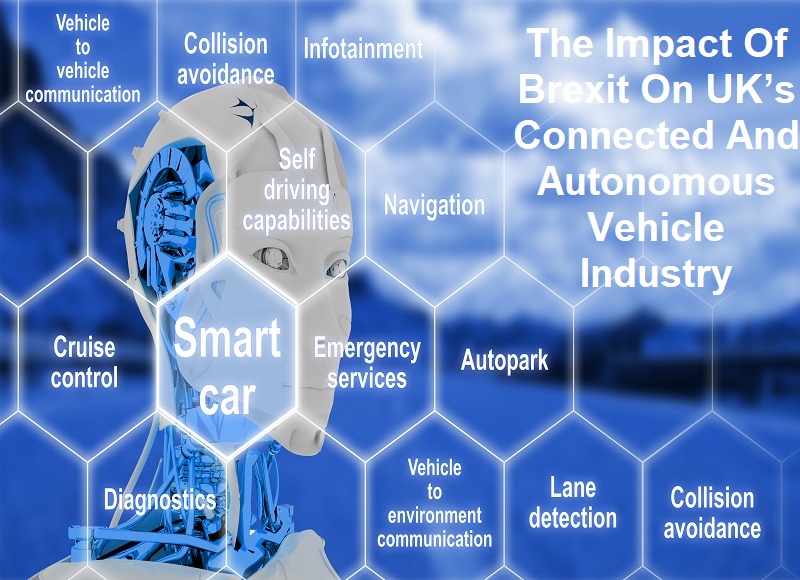By Jo-Ann Pattinson (Research Fellow, Institute of Transport Studies, University of Leeds) and Subhajit Basu (Associate Professor, School of Law, University of Leeds)
The world of connected and autonomous vehicles is upon us. Here in the UK, autonomous vehicle researchers and developers are on course to deliver this new reality. Many vehicles today include semi-autonomous features, such as assisted parking and self-braking. The advantages of autonomous vehicles are many: safer roadways, lower shipping costs, lower insurance rates, to name but a few.[1] But can the UK be competitive? Can it continue cutting-edge research, and can it have influence around the world? As we disengage from our European cousins on 31 December 2020, it is not at all clear how the UK will maintain its presence in the development of autonomous vehicle technology.
Take the issue of competitive edge. Data sharing plays an essential role in autonomous vehicle development. With a no-deal Brexit still in the cards, the UK’s reputation as a stable destination for inward investment is very much in question. The UK government is actively engaged in international discussions that are intended to provide arrangements for data sharing between connected vehicles, but these arrangements are time-sensitive and must be in place before the vehicles can become commercially available.
Moreover, the systems themselves rely on the exchange of data, much of which may be hosted and routed outside of the UK. There is no guarantee, post-December 2020, that European businesses will be permitted to share data with the UK as they do now under the EU General Data Protection Regulation (GDPR). Indeed, the UK government is on record as having opposed the more “anti-innovation” aspects of the GDPR. No sharing of data with the EU likely means no autonomous UK vehicles on EU roads. In fact, any UK-developed vehicle certified by the UK approval authority, the Vehicle Certification Agency, will not be valid in the EU, and this will force UK manufacturers to use other European approval authorities. Moreover, with information hosted and routed outside of the UK, it may force the UK to take a back seat from having led the research and development for a considerable period.
Talking about regulation, the UK has historically acted as an influential and active member of the UNECE World Forum for Harmonisation of Vehicle Regulations (WP. 29), which offers a unique framework for globally harmonized regulations on vehicles.[2] Until recently, the UK acted as Chair of the committee tasked with designing the future regulation of autonomous vehicles. However, post-December 2020, as a single nation, rather than as part of the EU voting bloc, it remains to be seen whether the UK’s weight at the UNECE will be reduced. There may be no strategic advantage available, should the UK wish to take a position contrary to that of the EU member states. Brexit may have dealt a blow to UK influence and standing on the world stage of transport regulation as it operates at the UNECE as a single nation.
Unfortunately, the situation for research and development is even direr. The UK has been in an advantageous position up to now, with research and development stimulated by flexible and supportive legal frameworks.[3] Prototype testing in the UK is encouraged through self-regulation,[4] facilitated by a code of practice.[5] However, such prototype development is expensive and is most effectively achieved by the integration of expertise.
The separation of the UK from the EU has dealt a serious blow to expertise on a number of levels. Not only will there be an effective wall between UK-based and EU-based researchers, but there will be less money with which to conduct this research. UK-based researchers have, until now, been able to access state-of-the-art research and expertise while being a beneficiary of and contributor to the €80 billion Horizon 2020 EU Research and Innovation Programme. This will end now. Much smaller funding opportunities are offered domestically, and researchers are looking further afield, such as to the United States. This will harm our universities and research laboratories, at a time when the automation industry is going through extraordinary innovation.
The UK is in the pole position in the global race to
market for connected and autonomous vehicles.[6] Autonomous driving trials
are taking place in our major towns and cities, including London, Birmingham,
Bristol and Milton Keynes.[7]
While
Brexit potentially affects all UK business interests,
the fledgling connected and
autonomous vehicles sector is particularly vulnerable to a tumultuous
legal and political landscape.
[1] Coalition for Future Mobility, https://coalitionforfuturemobility.com/benefits-of-self-driving-vehicles/
[2] https://www.unece.org/trans/main/wp29/meeting_docs_wp29.html
[3] In 2018 UK government passed a new law – the Automated and Electric Vehicles Act. Under the act, someone who is injured or whose property is damaged in a collision with a vehicle operating with high or full automation can pursue a claim against the motor insurer, who will be primarily liable to deal with that claim.
[4] There are no barriers in the UK’s road traffic laws to restrict having driverless vehicles on the roads – meaning it is “perfectly legal” to test automated technologies.
[5] In 2015, the Government published a detailed review of existing legislation to establish the regulatory situation with regards to testing of automated vehicle technologies and their longer-term introduction to the market. One outcome of the DfT review was the development of ‘The Pathway to Driverless Cars: A Code of Practice for Testing’. This Code of Practice is non-statutory but has been developed to promote responsible testing. Further proposed new laws regarding driverless cars were introduced before the UK parliament in October 2017. The Automated and Electric Vehicles Bill makes provision for the registration of all driverless cars in the UK and addresses how liability for accidents involving such vehicles should be apportioned. The Bill is also designed to support upgrades in UK infrastructure to support anticipated growth in the use of electric vehicles.
[6]https://www.smmt.co.uk/reports/connected-and-autonomous-vehicles-the-global-race-to-market/
[7] A self-driving electric Nissan Leaf has navigated itself 230 miles up the country to complete the longest and most complex autonomous journey ever achieved on UK public roads. The £13.5m project, which included a consortium of nine industry partners and was funded by the UK government’s Centre for Connected and Autonomous Vehicles (CCAV) https://www.theengineer.co.uk/human-like-nissan-leaf/





 Business Implications of COVID-19 Pandemic
Business Implications of COVID-19 Pandemic